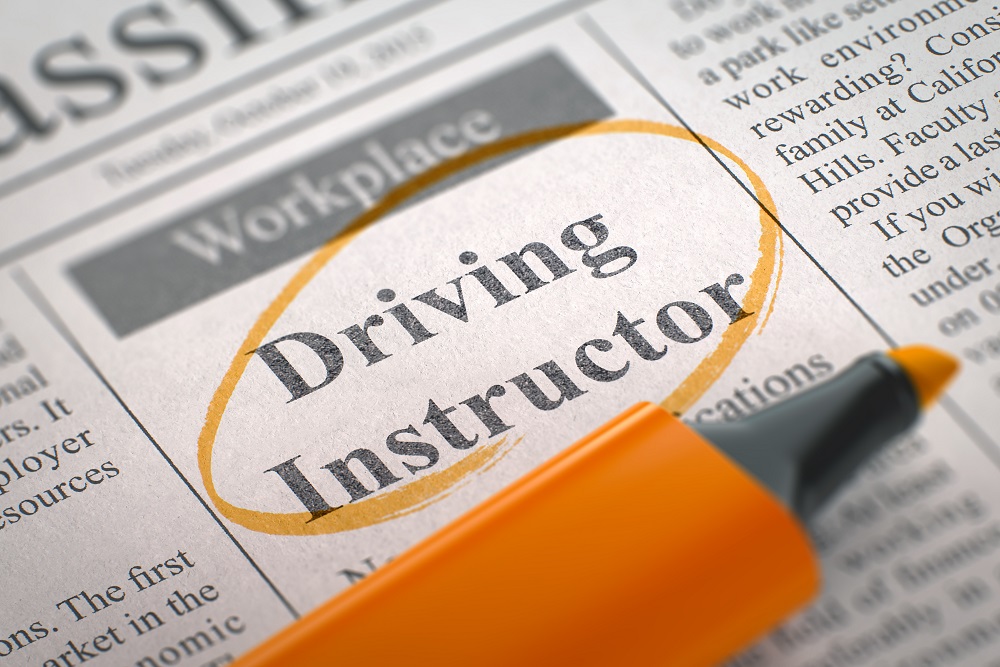You’re not alone if you’re thinking about becoming a driving instructor.
Due to the pandemic and subsequent lockdowns, there are now more learner drivers looking for instructors than ever. According to research conducted earlier this year by the Driver and Vehicle Standards Agency (DVSA), there are so many individuals wishing to learn to drive that the waiting list for tests has remained over half a million since June 2021 and was 551,271 in May 2023.
What’s more, the 2023 Annual UK Driving Instructor Review revealed that 40% of driving
instructors are now achieving gross weekly earnings of £1000 or more.

The pandemic has encouraged people to rely on themselves for an income – and becoming a driving instructor could be a good way to do that. We’ll go through the pros and cons of being a driving instructor, how the process works and whether you should go with a franchise or become an independent driving instructor.
How long does it take to become a driving instructor?
Normally, it can take between six and 12 months to become a driving instructor. However, waiting times for tests is an issue at present.
“The training can actually be done. If you really wanted to downsize it, technically you can do the training in a week or two,” said Michael Sargent, founder of Nayland Driving School. He suggested studying for the advanced theory in your own time. The training for the advanced driving test usually takes about eight to ten hours, polishing up on bad habits.
“You could deliver that in a couple of days, but you might not get a test for two months,” he said. “We’re getting people to book the test, then about a month before the exam, we’re starting the training, seeing them a couple of hours a week.” From there, you can also do a couple of hours in your own car, giving you a week to practice. Doing the same for another couple of hours, a week to practice and then another couple of hours. “Then when we get to the final exam, that’s 40 hours’ training,” he said.
After passing the second part of the test, you have the option to apply for a trainee licence which is valid for six months. You’ll either need to:
- Be supervised for 20 per cent of all lessons you give while you have your trainee licence
- Do at least 20 hours of extra training while you have your trainee licence
How much can I earn as a driving instructor?
This will vary depending on whether you’re independent or part of a franchise, then there’s variety within that. However, as demand has grown, so have the prices of lessons, and the 2023 Annual UK Driving Instructor Review survey indicates that instructors are now earning more than £30 per hour on average for the first time on record. More on that in a minute.
Am I eligible to become a driving instructor?
To become a driving instructor, you need to be at least 21 years old and have had a full driving licence for over three years.
The government says that your application may be rejected if you’ve had a driving ban, have five points or more on your licence or have been convicted of any non-motoring offences. This will be decided on case-by-case basis by the ADI Registrar. Your application is likely to be rejected if you’ve been banned from working with children or have sexual assault, violence or drug-related crime offences.
You must get a Disclosure and Barring Service (DBS) check to begin your driving instructor application, even if you already have one. A basic DBS check costs £10.
Normally you’d need to have a manual car because tests are carried out in manual vehicles. If you have a disability and want to become an automatic instructor, then you can have an automatic vehicle.
“If someone is curious about becoming a driving instructor, I quite often spend an hour on the phone, or an hour having a coffee with them,” said Sargent. “It’s genuinely quite a big decision.”
He said that being friendly, approachable and reliable are key qualities for a driving instructor. A clean car is also essential. “These are sort of things that students notice. The teaching stuff, they don’t notice so much. Even if you’re struggling with the teaching, in the early stages, they naturally always assume it’s them. If they can’t grasp something, they won’t for one minute think it’s your teaching, because they can’t drive.”
What are the pros and cons of being a driving instructor?
As we’ve established, there’s plenty of work out there, meaning more money for instructors. Driving instructors have increased their prices since the pandemic and are now earning £33.41 an hour on average, compared to the average of £27.60 an hour in 2020 (The 2023 Annual UK Driving Instructor Review, 2023).
The same survey revealed that, for the most part, driving instructors also have a high level of satisfaction when it comes to work, with 92% claiming to be at least ‘satisfied’ and 42% reporting ‘very high feelings of satisfaction.
>See also: Tips on how to achieve work-life balance
However, something to consider when becoming a driving instructor is that you will be, in most cases, self-employed. And, while there are many perks to self-employment, there are some drawbacks, including a lack of stability. “I think the main reason [instructors have left], from my point of view, is a lot of them weren’t entitled to anything during lockdowns. They’re self-employed, but they hadn’t been self-employed three years and couldn’t show three work three years’ worth of books,” said Sargent. “From the people I speak to, more than anything, they’ve left because they didn’t have a choice.”
What does the test consist of?
It’s made up of three qualifying tests.
Test one – ADI test part one (advanced theory)
Cost: £81
This is similar to the standard learner’s theory test in that there’s a multiple choice and hazard perception element.
Take your photocard licence to the test. If you don’t have one – you should bring your passport along with your paper licence. If you don’t have a passport, you will need a photocard licence.
Depending on where you’re doing your test, you may have to wear a face covering. In England it’s your choice to wear a face covering but in Scotland and Wales it’s compulsory unless you’re exempt.
Test two – ADI test part two (advanced driving)
Cost: £111
The second test is a driving ability test – otherwise known as a practical test. If you pass the second ADI test, you have the option to apply for a six-month trainee licence so that you can experience teaching students. It costs £140 to apply for a trainee instructor licence.

Test three – driving instructor test
Cost: £111
Part three of the test measures your ability to teach students. Your instructor will call you a few days before and ask you where you want to start the test – it can either be the driving test centre or within five minutes of the test centre. Note that it works differently in Northern Ireland.
Driving instructor training is also available if you want help before the test.
For this test, you’ll need your licence, a suitable car and a pupil. You should also bring a log book with you that details the training that you’ve been doing to qualify as an approved driving instructor.
The driving examiner will watch you give a 45-minute lesson where your pupil must be driving for at least 40 minutes of the lesson. You must discuss the goals of the lesson and risk at the beginning. At the end of the lesson, give your pupil no longer than three minutes to reflect on the performance in their lesson.
Your pupil can be a partly trained learner, a fully trained learner or a full licence holder. However, they cannot be someone who has just started learning to drive or an approved ADI or someone looking to take their ADI test.
You can retake if you fail the third test once or twice, but if you fail three times, you need to take the ADI 1 and 2 again. You must wait until two years after you originally passed your ADI 1 test before sitting it again. You can also appeal if you fail your ADI 3 and you feel your examiner didn’t adhere to the law during the test.
If you pass you must apply for your ADI licence within 12 months or sit the three qualifying tests again. It costs £300 to register for your ADI certificate. When you have this certificate, you can start charging for lessons.
Should I join a franchise or be an independent driving instructor?
This is arguably the biggest decision you make once you become a driving instructor. You can either set up as a sole trader with your own business or be an instructor with a driving school. You’ll still be classed as self-employed whatever you decide.
>See also: How to become a sole trader
If you’re with a brand, you get support with finding pupils, marketing and other essentials. The flipside is that you’re not in control of everything. Introductory lessons are often charged at a reduced rate, for example, which is out of your control. The cost of lessons will be determined by the cost of living where you’re teaching.
If you’re independent, you’ll have more control of your schedule and your clients. It is more time-consuming taking care of admin and repairs, though.
Sargent said that most people will recommend joining a local franchise. If you take the trainee licence option mentioned above, you don’t really have much choice because you need a sponsor for supervision. “There are some ways around it,” he said. “If you know a good driving instructor down the road, you might be able to get them to sponsor you. Generally, you’ll join a school and the school is going to become your sponsor.”
That’s not to say that once you make the decision on independent vs franchise, you can’t switch. It’s especially true of joining a franchise, which some see as a first step to becoming independent.

“I think quite commonly, we see people stay with a franchise for two, three years,” said Sargent. “Once they start getting a good reputation, getting the phone call saying, Oh, you know, we you taught my brother, you taught my sister, my friend, whatever, that’s when they start thinking, ‘Yeah, but you know what? I think I can make a go of this now.’”
“If you’re going to go independent, now’s the time. There’s so much work around.”
What insurance do driving instructors need?
To become a driving instructor, you’ll need to consider the insurance you need.
Numerous policies could benefit your business, but not all of them are legally required. So, let’s split your options into two categories.
Legally required policies
As a driving instructor, you’re legally required to take out ‘Driving instructor insurance’. This policy is much like a standard motor insurance policy, except it has additional coverage due to the risks associated with learner drivers taking to the roads.
Additionally, if you employ anyone, you’re required by law to take out ‘Employers liability insurance’. This policy protects you financially if any of your employees make a legal claim against you.
Highly recommended policies
Not all policies are required by law, but that’s not to say you should go without them. Insuring yourself against potential damage to your vehicle and breakdowns could not only save you hassle but a lot of money too.
Here are some policies you might want to consider:
Scratch and dent for taxi drivers and driving instructors – nothing makes a car look more unprofessional than visible scratches and dents. With this policy, you’ll be covered financially for repairs.
Motor GAP insurance for driving instructors – as a driving instructor, your vehicle is more liable to significant damage. Motor GAP insurance covers the financial discrepancy if your car is written off and your motor insurance policy won’t pay out the full amount you paid for the vehicle.
Motor breakdown insurance for driving instructors – there’s never a convenient time to break down, but when your car is your livelihood, getting it back up and running ASAP is essential. And motor breakdown insurance will help you do just that.

Atia Farooqi is a driving instructor with RED Driving School and is based in Manchester.
How long have you been with your franchise?
Since 2018. I’d been working in a call centre at another company.
I did my training. I passed my part one and part two. Then I signed up with RED to do part three, because you need to have the 40 hours training. I did my training while working full-time. I probably knew it was going to be hard because I’ve got a family as well. But I knew in the end, it’d be better for them. Once I completed everything, got my training licence and did my business seminar (you have to do a two-day business seminar with them), then I left my full-time job and started in the January as a full franchisee.
What made you choose a franchise over going solo?
I chose the full franchise because I’m somebody that’s never been self-employed. I’ve always been employed, so I don’t have to worry about anything. I just go to work, do my work and I get paid at the end of the month. It was more probably for the support and to help me kind of wean myself into it. There was going to be somebody there to help me.
What kind of support do driving schools provide?
They provide you help with doing your taxes and stuff. They also provide business support as in advertisements, your social media, they’ll help you get started with that. Social media, in this day and age, is how everything kind of works. Whenever I had any question about the actual job, because I’d never done it before, they were there. I used to be a teaching assistant. The teaching aspects were okay, but it was a new subject. So any help I needed with things like that, I’d ring up my trainer and he’s like, ‘Yeah, no, try this way’ or ‘Look at this’. When you first start up, throughout your training and they give you a lot of stuff to help you – with the guidance of how you should be doing things, what kind of things you need to know, how you can teach it and adapt it to different people. You can’t teach the same thing to everybody. You have to be able to adapt to your customers and they’re helping you with things like what to look out for, how you can approach them in different ways and so on.
Do you utilise your own personal social media or do they provide some channels for you that you can use?
They didn’t do it for me. They will just tell you that one of the best ways to get out there is social media. They encourage you to create your own Facebook page, what kind of things you can put on it, what kinds of things you should stay away from, things like that. The more likes you get and the more people that are on it, the more recommendations you get. Honestly, Facebook has been great. I asked one student that just tagged me in everything for help, so it’s a good tool, especially for people that don’t use it or haven’t used it before.
I can imagine that a franchise will give you continued support with things like legal changes, changes to how to conduct driving lessons, especially during Covid – they would have kept you up to date with that kind of thing, giving guidance and so on.
If I’m really honest, and I’m not just saying it, they’ve been absolutely brilliant throughout Covid. They have kept us up to date with everything that’s going on. We got weekly videos when we were sitting at home in lockdown. When you get that insight, you think, ‘Right, a bit of hope that it’s going to get better. We are going to get back to work.’
They do keep me up to date with everything that’s going on – DVSA announcements, any changes. I don’t know about other companies that have not worked for the company’s driving schools, but I do know a few people that are independent. They didn’t get support like that because they’re independent.
Why do you like being a franchise driving instructor rather than an independent?
Being independent, I suppose you do a lot more yourself and I wouldn’t have the support, I would need to be my own support. I would have to go and find out all these things that RED would quite happily share with me, like car maintenance.
Or I’ll book it into Renault or Quickfit, or wherever. I just send a quick email rather than phone and they’ll respond, let me know what I need to do. So that is the big thing, because we need the car every day to work.
Students know that I’m a driving instructor. People took lessons with me, not because of me, it was because of RED. It was because of the brand. That’s it. I’ve been doing it a while, so now I’ve got word of mouth. I’ve got one girl that passed a couple of years ago and I taught her older brother. I do lessons with her younger brother and her sister-in-law now.
My sister is an independent driving instructor and she has been doing it for about 20 years. I don’t have any intentions of becoming independent at the moment, but she goes on at me all the time, ‘I’m an independent, come join me!’ I like the way RED treat me and the way they look after me. I have a good relationship with them. They gave me the support that I want when I need help. I can go to them.
How has the role of your job changed since the pandemic hit? There are backlogs and long test waiting times. How have you adapted to that and how has being with a franchise helped?
I think, speaking for all driving instructors in our schools, there is a huge demand at the moment. There’s the normal backlog, the normal people that just come in and want to learn how to drive, but even more people in lockdown that wanted to do it now want to do it. When I first went back after the first lockdown, I was really busy. Don’t forget that the pandemic changed things for everybody. When I was really busy, I thought to myself, ‘Okay, I’ve had all this time off, and I really enjoyed it.’ I wanted to go to work, but I did enjoy being at home. I thought, ‘Okay, I’m going to take my time with everything. I’m not going to work every hour, doing whatever.’
If I’m honest, work has been busy. But the whole point of doing this, and I can’t forget it, is I have got more time at home with my kids. My youngest is growing up quick and I didn’t want to miss out on that time. It lets me take her to football training. I’ve also started doing my functional skills for math because the whole point was, I need flexibility, because I’ve always wanted to be a midwife. I’ve done my level one over this last year, In the pandemic, and I’ll be going to do my level two in September, but this can give me the flexibility. Even though we’re really busy, I can still take time out to do what I need to do.
You don’t feel pressure to take on extra pupils?
No, not at all. The good thing is, if I feel like, ‘Well, I’ve got a bit of spare time’, I can just easily let them know and pop another student in my diary. I’ve only opened my diary once since we went back in April, because I had students waiting from before Christmas time.
Do you feel there are advantages to being a female driving instructor?
Yes. Because I’ve had students make comments before. As we’re in 2021, I didn’t think people still felt like that. Some females, not all of them, they say to me that women are a lot softer. They are a lot more understanding. I’m not saying male instructors aren’t, but some of the students prefer women.
Chester Dent was part of a franchise before deciding to become an independent driving instructor in Guildford.
You used to be with a franchise and you’ve since gone independent. When did you go independent?
I started in the middle of June this year. I needed to give the franchise three months’ notice before I left. I started with the franchise in March 2009.
What was it that made you go independent?
I wanted more control of my time. The franchise website was giving offers. I had to do the first session half price, for example. I realised that around here, it’s not a price-sensitive market. If anything, it’s supposed to be a bit more expensive – it’s reassuringly expensive to the parents. I realised that I was actually at the bottom of the market with that franchise. They were based in Essex and I’m based in Surrey. The rates were substantially lower than the going rate round here. I realised that, when the driving instructor who lives around the corner asked if I could fill in for him and then he said that he could only do that on the basis that I matched his prices. That’s 30 per cent more than I was charging at the time. I had to negotiate that I had a separate rate that was different for my area. They had to upgrade their website at the franchise and it’s all a bit complicated, but in the end, the main reason I went independent was my time.
What other limitations did you find with a franchise?
They manage your diary, take a phone call, when you’re driving your car. In theory, they are helping you to manage your time. In practice, all they really do is give you the first session with somebody, so you’ve committed to whoever that person is without speaking to them, whenever that person wants. I found myself restricting my diary to blocking out practically all the time, so that I could predict when I was going to get a new person.
The other reason is that I wanted to go from two-hour lessons to 90-minute lessons. I realised that after about an hour and a half, I was losing the will to live. An hour and a half is more than enough time. Also, when I was raising my rate, it didn’t seem so bad to give six lessons, instead of a package of five. Although they’re shorter, I think people get more benefit from having an extra lesson.
I think the franchise fee was £80 a week and I negotiated that down a bit.
Have you been a business owner before?
Yeah. I don’t consider myself to know anything about business, but I have had other small companies in the past.
I’ve been a sole trader and I’ve had another limited company and I have another business. I started working as a driving instructor because we had a baby in 2016. I had to have a change my lifestyle, spend more time at home while I was running another business without the other work I did before that.
Do you have any marketing tips for anybody reading who might want to be an independent?
I made my own website and got on Google and started getting people in and got repeat business from other family members and that kind of thing. Now I’ve got more people than I can cope with. I did a bit of website design in a different incarnation years ago, so I didn’t find that part difficult. I used Google Ads for two or three months. I don’t pay them anymore.
I took quite a long time to decide quite how I was going to pitch myself and I’m not sure if I quite got this right. I think it’s how you make people feel, rather than something technical. I tried to make my website about selling a good feeling. Calm, reassuring, easy going.
What was it like when you first transitioned from franchise to independent?
It was fairly seamless. By the time I left, I had everything in place. I was putting myself out there.
The most time-consuming thing about it is arranging when the lessons are going to be, where you’re going to be so that you’re not having to travel too far between people, creating a sort of bearable schedule. I work nine until six and then I probably do another hour and a half to two hours of just arranging things and pencilling in lessons, getting everything paid in advance. Then keeping everything up to date. Knowing who I’m going to see and what my day is going to be like, how long I have to drive between people, I’d rather be in control of all that.
The only thing that made all this really come together is on an app that I use. It helps organise my day. It connects to my website too, so I can pay with Stripe, PayPal or credit cards directly on the website. Most of my time is either spent on driving, or spending hours on the app, working on the diary and the finances. By the time I’d left the franchise, I was using the app intensively and basically running my own business anyway.
For somebody who is training to become a driving instructor, would you recommend they go with a franchise before going independent?
Oh yeah, absolutely. The franchise I joined was very supportive. I’d say that without doing the job, you can’t really learn it. I think just putting the hours in is really important. It took me quite a long time to qualify.
First of all, legally, you have to be trained and belong to a driving school before you qualify. In theory, you could pass your part three and go independent. But I would recommend it – you need that supportive environment and you need time to find your feet and realise what it is you need.
I don’t have the experience of a big franchise, but my experience with smaller franchise. I think they had only nine instructors when I joined. They’re reasonable, you can talk to the boss. I felt very good and I felt a loyalty to them, which I might not have done with a larger franchise.





